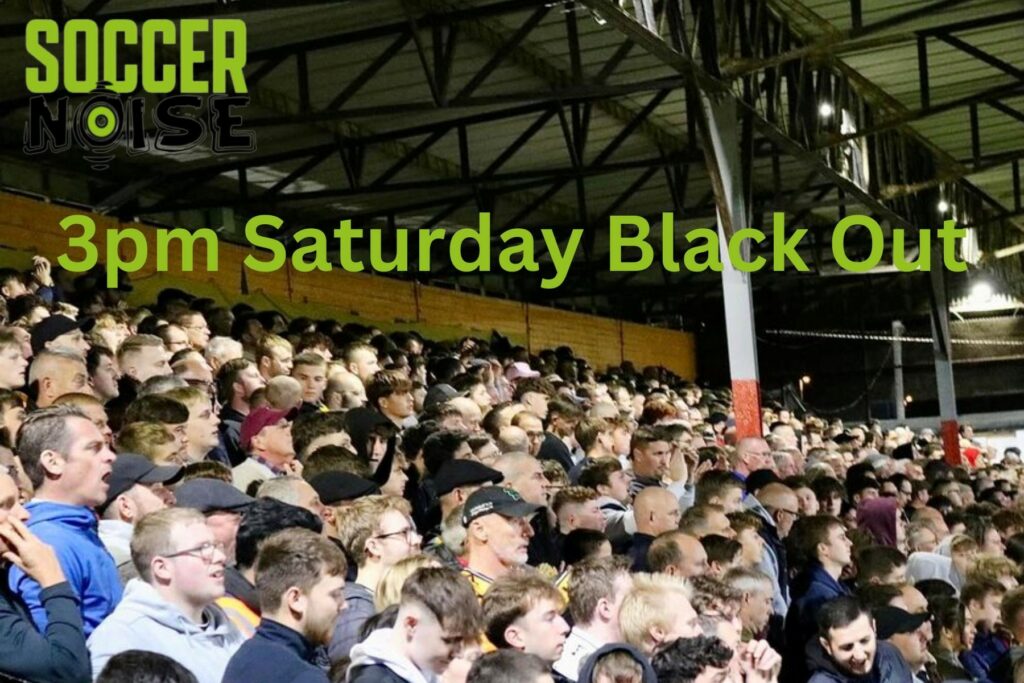In the UK the Saturday 3pm kick off has long been the hallowed slot for watching football. It gives away fans enough time to criss-cross the country, both before and after the game. Earlier and they may struggle to make a kick off, later and they may struggle to get home at a reasonable hour, if at all. There has long been a rule in place about the broadcasting of the 3pm kick off time and lot’s of football fans aren’t happy about it.
Can you watch the 3pm games in the UK? You cannot watch football matches that kick off at 3pm via television or streaming. Since the 1960’s any UK football played between 2:45pm and 5:15pm on Saturday’s is subject to a black out rule and cannot be broadcast live inside the UK. This is designed to protect the live experience of going to watch a football match at the traditional timeslot.

Aimed primarily at protecting the attendance figures in the lower tiers of the football pyramid, the 3pm blackout rule has come under a lot of scrutiny in recent years. Not least because of the premium cost of watching Premier League football via Sky Sports, TNT Sports and Amazon. When fans in other countries who aren’t paying through the nose to watch UK teams can casually turn on the TV and watch any Premier League game they want, it’s a bit of a kick in the teeth for many UK fans who probably wouldn’t be watching a game in the stadium anyway.
Why is there a 3pm football blackout in the UK?
The 3pm blackout was first introduced as an idea in the 1960’s by Bob Lord, who was the chairman of Burnley Football Club and concerned that the growing trend of televising football matches would see a steady and damaging erosion of in person attendance at games, especially lower down the English football pyramid. In 1964 when the still running BBC football highlights programme Match of the Day first aired, Lord banned the BBC from televising matches played at Burnley’s Turf Moor ground. This ban stayed in place until 1969. Soon Lord had managed to push through the 3pm Black Out Rule and it was accepted by the other chairman of football clubs in England coming into effect for the 1965-66 season. Any football played between 2:45 pm and 5:15 pm on a Saturday, the traditional slot for English League Football, could be broadcast live in the UK. Initially this excluded the FA Cup Final, however in 2012 the Kick-off time for this crown jewel fixture was moved later in the day.

The precise history of the UKs relationship with UEFA’s article 48 rule is a bit vague, what is known for sure is that in 1987 when the UKs ITV struck a major broadcast deal with the Football League, Article 48 of the UEFA rules came into force. Article 48 allows member FA’s to designate a 2.5 hour weekend slot when live football is banned from screens. In the UK this was chosen as the 14:45 – 17:15 time slot, which covers the traditional Saturday 3pm Kick-off time. It has been in force ever since.
The Saturday Blackout in the UK, while designed primarily to prevent the broadcast of domestic games, actually applies to all football, no matter where in the world the game is taking place. In fact only England, Scotland take advantage of Article 48. Previously Montenegro did, but this has since been repealed.
The details of UEFA’s Article 48 can be seen here.
Does UEFA’s Article 48 rule force the UK to have a 3pm Football Blackout?
The presence of UEFA’s Article 48 rule does not force any member FA’s to have a mandated football blackout. It simply creates the space for FA’s to choose to have one if they want to. In fact the idea of a 2.5 Football Broadcast Blackout in the UK almost certainly predates UEFA’s article 48. It was first introduced in the 1960’s, while UEFA’s article 48 only came into force in the UK in 1987.
The rule sof Article 48 is not just about the 2.5 hour blackout Window. It also puts into law the rights of each FA to control their own broadcast rights.
Article 48: Exclusive rights
1. UEFA and the member associations shall have the exclusive rights to broadcast and use, as well as to authorise their broadcast or use by picture, sound or other data carriers of any kind (including data carriers that have yet to be developed), matches which come within their jurisdiction, either live or recorded, in whole or as excerpts.
The part of article 48 that controls the blackout period reads as below:
ARTICLE 3 TRANSMISSION-FREE PERIODS
- Each member association may decide on two and a half hours on a Saturday or a
Sunday during which any Transmission of football may be prohibited within the
territory of the relevant member association. This prohibition shall apply only to
intentional Transmissions.
- The two and a half hours period (or periods) must be decided on by the member
association fourteen days, at the latest, before the beginning of its domestic season,
at which time they will enter into force and apply for the whole season.
- All decisions of member associations concerning “blocked hours” must be reported to
UEFA in writing at the time of the decision. This notification must be accompanied by
sufficient proof (see Article 3(5) below) from the member association that the chosen
hours actually correspond to the main domestic fixture schedule, as defined in Article
3(4) below. UEFA shall publish the relevant information and act as the governing
body for these Regulations.
If the English or Scottish FA’s chose to get rid of the 3pm Saturday Blackout they could. It would need to be done in agreement with all relevant parties. The Premier League and the EFL being the main two stakeholders in the discussion. While the rule was initially designed to protect the interests of Clubs lower down the football pyramid, recent discussions around it actually look a little different to how you might expect. It’s the Premier League who seem to be more reluctant to abandon the blackout, while there is a growing swell of support from EFL Clubs to open up the time slot for broadcast.
Will the Saturday 3pm Football Blackout ever be lifted?
The fact of the matter is this: A determined football fan can find a way to watch any Premier League game live, regardless of the blackout. For example all 380 Premier League games are broadcast legally in Australia. It would be simple for a fan to bypass controls with a VPN and access these games as streamed in Australia. We wrote about how this might be possible here.
So the big question really is… in the modern world, what is the point of the 3pm Football Blackout?
In the German Bundesliga all matches are televised and they see a steady stadium attendance rate of above 90%, similar to that seen in the Premier League. This should be evidence enough that the Premier League would be protected if the blackout was lifted in the UK.
The evidence is less clear when it comes to the lower leagues. There is an argument that by allowing games to be televised teams lower in the pyramid can start to grow support amongst those who might never otherwise attend and watch matches live and in person. While those who go to their local club as part of a tradition are unlikely to change just because they could watch their team or another team live on TV at the same time.
The counter point for the EFL can be summed up by Kevin Miles, Chief Executive of the Football Supporters Association (FSA). He said in 2022:
“Everyone is responsible for maintaining that environment in which football at all levels can not just survive, but thrive. The professional game should exercise extreme caution before contemplating the end of the 3pm blackout. Removing the blackout would have dramatic consequences for the pyramid, many unforeseen, which is why FSA members up and down the pyramid have strongly resisted any relaxation of this protection.”
In October 2022 the (EFL) announced it was willing to make all of its games in a season available to broadcasters to screen live including those within the 3pm Blackout. They were interested in listening to proposals of how this would work from broadcasters ahead of the 2024-25 season when the current broadcast rights deal would end,
While no contracts have been signed yet, the Premier League has announced a Tender period for 5 packages. While they have increased the number of games by adding in all the Sunday 2pm kick-offs, they have not looked to alter the 3pm Blackout Period and any Saturday 3pm kick-offs remain absent from the packages.
Similarly the EFL, despite it’s announcement, looks most likely to remain with Sky Sports, who have shown EFL games since 2002 who traditionally have not pushed to bypass the Saturday blackout.
So for now, the next TV broadcast rights deal, which will last up to 5 seasons, looks set to retain the 3pm blackout. Of course, there is no reason that during that contract negotiations to change this up couldn’t happen.
Eventually to the 3pm Blackout will be lifted, similar to the Film Industry and the music industry before them, the ease with which content can be streamed and accessed illegally will force change. Ultimately the public has always chosen to pay money for something legally, rather than stream it illegally, as long as the option is provided.
